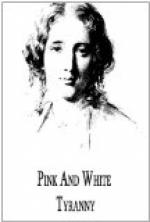CHAPTER
I. Falling in love
II. What she thinks of it
III. The sister
IV. Preparation for marriage
V. Wedding, and wedding-trip
VI. Honey-moon, and after
VII. Will she like it?
VIII. Spindlewood
IX. A crisis
X. Changes
XI. Newport; or, the paradise of
nothing to do
XII. Home A la pompadour
XIII. John’s birthday
XIV. A great moral conflict
XV. The Follingsbees arrive
XVI. Mrs. John Seymour’s party,
and what came of it
XVII. After the battle
XVIII. A brick turns up
XIX. The Castle of indolence
XX. The Van Astrachans
XXI. Mrs. Follingsbee’s party,
and what came of it
XXII. The Spider-web broken
XXIII. Common-sense arguments
XXIV. Sentiment v. Sensibility
XXV. Wedding bells
XXVI. Motherhood
XXVII. Checkmate
XXVIII. After the storm
XXIX. The new Lillie
CHAPTER I.
FALLING IN LOVE.
[Illustration: Lillie.]
“Who is that beautiful creature?” said John Seymour, as a light, sylph-like form tripped up the steps of the veranda of the hotel where he was lounging away his summer vacation.
“That! Why, don’t you know, man? That is the celebrated, the divine Lillie Ellis, the most adroit ‘fisher of men’ that has been seen in our days.”
“By George, but she’s pretty, though!” said John, following with enchanted eyes the distant motions of the sylphide.
The vision that he saw was of a delicate little fairy form; a complexion of pearly white, with a cheek of the hue of a pink shell; a fair, sweet, infantine face surrounded by a fleecy radiance of soft golden hair. The vision appeared to float in some white gauzy robes; and, when she spoke or smiled, what an innocent, fresh, untouched, unspoiled look there was upon the face! John gazed, and thought of all sorts of poetical similes: of a “daisy just wet with morning dew;” of a “violet by a mossy stone;” in short, of all the things that poets have made and provided for the use of young gentlemen in the way of falling in love.
This John Seymour was about as good and honest a man as there is going in this world of ours. He was a generous, just, manly, religious young fellow. He was heir to a large, solid property; he was a well-read lawyer, established in a flourishing business; he was a man that all the world spoke well of, and had cause to speak well of. The only duty to society which John had left as yet unperformed was that of matrimony. Three and thirty years had passed; and, with every advantage for supporting a wife, with a charming home all ready for a mistress, John, as yet, had not proposed to be the defender and provider for any of the more helpless portion of creation. The cause of this




